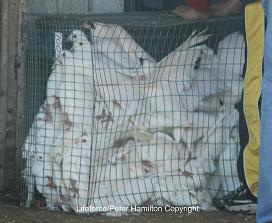|
|
Lives For Sale Featured In The Province
posted on June 30, 2008
 The Lifeforce investigation Lives for Sale has been featured in the June 29th province newspaper. The Lifeforce investigation Lives for Sale has been featured in the June 29th province newspaper.
Lifeforce explains some negative suggestions in the Province story, in an official letter to the Province.
Animals faced 'appalling' conditions
Sick, injured livestock crammed into boxes, tied up and thrown
Glenda Luymes, The Province
Published: Sunday, June 29, 2008
An undercover investigation at a Fraser Valley livestock auction has an activist group calling on the Canadian Food Inspection Agency to increase inspections.
Peter Hamilton, founding director of the Lifeforce Foundation, took video and photos of sick and suffering animals at the Fraser Valley Auctions in Langley between May 2007 and May 2008.
The footage shows buyers stuffing chickens into tiny cardboard boxes and sheep with their legs tied together being tossed into the backs of vehicles. Other animals appear to have broken legs and open sores.
"There were appalling violations of federal and provincial laws," Hamilton said yesterday. "Sick animals may be unknowingly eaten by people."
The Lifeforce report, called Lives For Sale, was sent to both provincial and federal agriculture ministries, in addition to the CFIA and BC Society for the Prevention of Cruelty to Animals. The groups involved have discussed the report and will take action to combat the issues that "periodically come up in auctions across B.C.," said SPCA chief animal protection officer Shawn Eccles.
While some of the allegations made in the Lifeforce report are unfounded, such as the suggestion that a goat with four horns represents some sort of abnormality when certain breeds are naturally born that way, the SPCA was concerned to see emaciated horses and cows being sold, in addition to flagrant animal transportation violations.
Eccles said it's very easy for government to "pass the buck" because there's no single body looking after animal welfare.
The CFIA inspects slaughterhouses and ensure the safety of all meat sold to Canadians, so while bringing sick animals to auction may be cruel, it is not a major food safety concern at the auction level. The CFIA must also ensure the safe transport of all animals under federal legislation, something that the Lifeforce video showed being overlooked.
Contacted by The Province yesterday, the CFIA said it was investigating the validity of the allegations and could not comment further.
The provincial Ministry of Health also oversees food safety in B.C., while the Ministry of Agriculture becomes involved in enforcing provincial legislation surrounding animal disease protection.
B.C. Chief Veterinary Officer Dr. Ron Lewis said any allegations of cruelty are "concerning" to the ministry, which works to "educate producers on how their animals need to be treated."
That leaves the SPCA to ensure animal cruelty laws are not being broken. Eccles said the SPCA will be conducting checks at the auction in the future to identify the people who are bringing mistreated animals to the sale and to ensure buyers are following the law.
Auctioneer and owner Ken Pearson said he works in partnership with the SPCA and CFIA to ensure rules are followed, but he can't stop buyers and sellers he doesn't see.
"We don't allow abuse to animals on the property," he said, accusing Lifeforce of using old photos in its report. "I've been doing this for 29 years. Why would I let abuse go on? We can't keep track of every person [buying and selling at the auction], but we do the best we can."
Legislation stipulates that the safety and treatment of animals while at auction is the responsibility of auction staff.
gluymes@png.canwest.com
Source:
 The Province Article Feature The Province Article Feature |
| |
| |
|
|